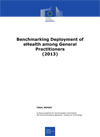 This is the final report of the study "Benchmarking deployment of eHealth among General Practitioners II" funded by Unit F4 of DG CONNECT. A survey of General Practitioners (GPs) was conducted in 31 countries (EU27+ Croatia, Iceland, Norway, and Turkey) to measure and explain levels of availability and use (adoption) of eHealth applications and services. A random sample of 9,196 GPs was interviewed and data was processed using sophisticate multivariate statistical techniques. The survey shows that access to, and use of, basic ICT (a computer connected to the Internet) in the consultation room has become almost universal in all countries (97% of the sample). For more advanced features such as Electronic Health Records (EHR), Health Information Exchange (HIE), Telehealth, and Personal Health Records (PHR), however, the data show that more progress is needed. Although there was progress compared to 2007, adoption of eHealth systems in primary care is still limited for HIE, Telehealth, and PHR. Some basic forms of EHR are now available to about 93% of GPs, but more advanced features are less widespread. Levels of adoption are influenced by GPs individual characteristics and attitudes as well as by country level effects, and by the perception of impacts and barriers. The majority of GPs place more emphasis on barriers than on benefits, and identify lack of financial incentives and resources, lack of inter-operability, and lack of a regulatory framework on issues of confidentiality and privacy as the main barriers. The levels of adoption registered suggest that we are still very far from reaching the target and objectives defined for eHealth both in the Digital Agenda for Europe and in the 2012 eHealth Action Plan, and that more policy efforts are need to facilitate uptake.
This is the final report of the study "Benchmarking deployment of eHealth among General Practitioners II" funded by Unit F4 of DG CONNECT. A survey of General Practitioners (GPs) was conducted in 31 countries (EU27+ Croatia, Iceland, Norway, and Turkey) to measure and explain levels of availability and use (adoption) of eHealth applications and services. A random sample of 9,196 GPs was interviewed and data was processed using sophisticate multivariate statistical techniques. The survey shows that access to, and use of, basic ICT (a computer connected to the Internet) in the consultation room has become almost universal in all countries (97% of the sample). For more advanced features such as Electronic Health Records (EHR), Health Information Exchange (HIE), Telehealth, and Personal Health Records (PHR), however, the data show that more progress is needed. Although there was progress compared to 2007, adoption of eHealth systems in primary care is still limited for HIE, Telehealth, and PHR. Some basic forms of EHR are now available to about 93% of GPs, but more advanced features are less widespread. Levels of adoption are influenced by GPs individual characteristics and attitudes as well as by country level effects, and by the perception of impacts and barriers. The majority of GPs place more emphasis on barriers than on benefits, and identify lack of financial incentives and resources, lack of inter-operability, and lack of a regulatory framework on issues of confidentiality and privacy as the main barriers. The levels of adoption registered suggest that we are still very far from reaching the target and objectives defined for eHealth both in the Digital Agenda for Europe and in the 2012 eHealth Action Plan, and that more policy efforts are need to facilitate uptake.
Download:
- Final report - Benchmarking Deployment of eHealth among General Practitioners (2013)
- Executive Summary - Benchmarking Deployment of eHealth among General Practitioners (2013)
- Annex I Technical Compendium - Benchmarking Deployment of eHealth among General Practitioners (2013)
- Annex II Country Reports - Benchmarking Deployment of eHealth among General Practitioners (2013)